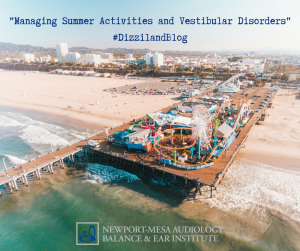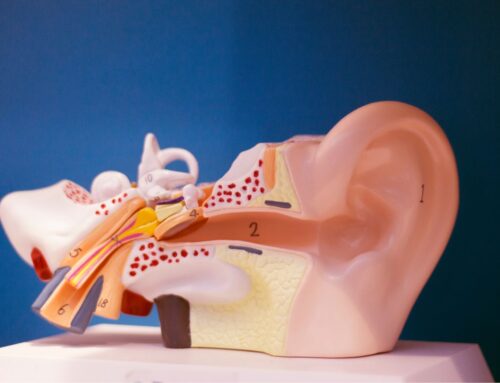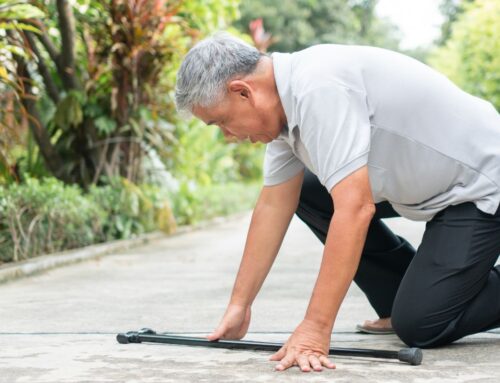
Let’s face it.
We love summer and everything that summer brings.
Good weather. Lots of activities to choose from. Perhaps even that vacation get-away you’ve been looking forward to? Or a stay-cation to explore the things you seldom make time for?
Who doesn’t love summer fun?
For those experiencing symptoms of dizziness and vertigo, adding in summer activities isn’t always ideal. So it becomes crucial to find ways to successfully manage it all.
Festivities and large public events can be overstimulating for someone with a vestibular disorder. We often mention the importance of using ear protection for events that involve loud noise, such as firework displays, sporting events, parades and concerts. Did you know that musical events can register at or above 120 decibels – that’s roughly as loud as an ambulance siren? Even the comfort of an air-conditioned movie theater can create sudden discomfort for our ears.
But too often in our busy fun-filled summer days, we forget about the more ‘random’ activities we enjoy that may also affect our balance: Things like using hobby materials and power tools, staying steady on recreational power sport and watercraft, or even travel.
If you, or someone you care for has a vestibular disorder, read on.
Here are our favorite helpful tips to manage and more fully enjoy summer activities:
Tip 1: Remember your sunglasses and hat. Use daily outdoors at home, and be sure to bring both along on a trip. The ability to manage bright lights may avoid triggers.
Tip 2: Protect your ears by carrying and using earplugs. You can’t wear them if you don’t bring them, so find a handy place to keep them ready to go! You may assess that everything’s fine and no need to use – but after a while, you may find it’s just a bit too loud for too long a time. Remember earplugs for the water too, to avoid swimmer’s ear.
Tip 3: Make a medication list card that can be reviewed in case of emergency. Keep in a handy place at home. Be sure to take a copy with you when you travel.
Tip 4: Consider investing in some type of walking aid to have handy should you need to steady yourself, or work through unfamiliar or uneven terrain.
Tip 5: Keep a cell phone nearby and within close proximity. Remember your charger, too.
Tip 6: Pace yourself and bring a buddy. Plan for breaks if you have balance issues. Be sure to plan a signal or communication plan so your companion can clearly ‘read’ if you’re in any discomfort or distress. Plus, often it’s simply more fun to have a buddy to enjoy activities with.
Tip 7: Stay hydrated with non-alcoholic and non-caffeinated beverages.
Tip 8: Consider taking additional vitamin D. Vitamin D is beneficial to maintain a healthy vestibular system. Though many people will soak up the sun (which provides vitamin D) more than usual during outdoor activities, they may discover they’re still vitamin D deficient. Remember to talk with your doctor to assess any suspected vitamin deficiencies.
Tip 9: Pack and take a medication kit that you can easily travel with it, whether it be for a day trip or a longer destination trip.
Tip 10: Restore simplicity by exploring the latest tech options. There are many new and improved ways technology may help manage your ear health and wellness, including Bluetooth-enabled and in-ear hearing devices that provide ideal enjoyment of activities, all-year long. Many are ‘hands free’ and have computing capabilities that react before our ears do!
Tip 11: Keep our Institute information handy. Let us assist you. Feel free to phone us at (949) 642-7935. You can also visit our website at dizziland.com or reach us at https://www.dizziland.com/contact/
So whether at the field, on the water or in the air, let’s make sure you’re ready…set and go!
Happy planning!






Leave A Comment